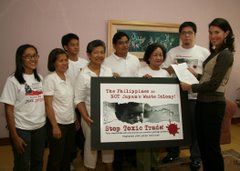 An activist from the Magkaisa Junk JPEPA Coalition dressed as Inang Bayan painted big red “X” marks on an oversized JPEPA report card, giving the flawed agreement a final grade of “FAILED” for its dismal failure to put the welfare of the Filipino people before its rosy promises and so-called profits. (Photo by Gigie Cruz/GAIA.)
An activist from the Magkaisa Junk JPEPA Coalition dressed as Inang Bayan painted big red “X” marks on an oversized JPEPA report card, giving the flawed agreement a final grade of “FAILED” for its dismal failure to put the welfare of the Filipino people before its rosy promises and so-called profits. (Photo by Gigie Cruz/GAIA.)Magkaisa Junk JPEPA Coalition Says JPEPA Incurable Of Defects
November 23, 2007.
An activist from the Magkaisa Junk JPEPA Coalition dressed as Inang Bayan painted big red “X” marks on an oversized JPEPA report card, giving the flawed agreement a final grade of “FAILED” for its dismal failure to put the welfare of the Filipino people before its rosy promises and so-called profits.
 Various environmental, labor and other civil society groups belonging to the Magkaisa Junk JPEPA Coalition were at the Senate this morning to raise their objection to another contentious scheme, as reported by Senator Miriam Defensor-Santiago,
Various environmental, labor and other civil society groups belonging to the Magkaisa Junk JPEPA Coalition were at the Senate this morning to raise their objection to another contentious scheme, as reported by Senator Miriam Defensor-Santiago,
“Even if we assume, for the sake of argument, that the JPEPA’s constitutional flaws could be corrected by such a supplemental agreement, what will happen to the other equally important issues that need to be solved?" asked Manny Calonzo of the EcoWaste Coalition, a member group of the Magkaisa Junk JPEPA Coalition. "Will the supplemental agreement substantially address issues such as Japanese protectionism with regard to agricultural products from the
Civil society groups also contested the legality of the proposed side agreement, saying that it is unethical and illegal to allow the same people who are supposed to ratify or reject the treaty to craft a means of salvaging it.
”It is not the Senate’s job to draft a side agreement that will allow them to ratify this treaty,” said Atty. Mimi Sison of the Green Initiatives Inc., another Coalition member. “The Senate's duty, given the well-known policy flaws and legal infirmities of the JPEPA aired during the Senate hearings, is to reject the agreement and let the Executive renegotiate it in an open and transparent manner with civil society participation.”
 During previous hearings the JPEPA came under fire from previous sectors, exasperating Senator Miriam Defensor-Santiago, chair of the Senate Committee on Foreign Relations, who at one point said she would "go up in flames" if she had to defend the JPEPA on the Senate floor.
During previous hearings the JPEPA came under fire from previous sectors, exasperating Senator Miriam Defensor-Santiago, chair of the Senate Committee on Foreign Relations, who at one point said she would "go up in flames" if she had to defend the JPEPA on the Senate floor.
The Magkaisa Junk JPEPA Coalition is apprehensive that Sen. Miriam Defensor-Santiago now appears to be trying to find ways to push this atrocious treaty through after all the pronouncements she made to the contrary in previous hearings. The Coalition pointed out that the Executive branch of government cannot negligently negotiate important preferential trade agreements like the JPEPA and expect the Senate to tidy up the mess afterwards every time.






No comments:
Post a Comment